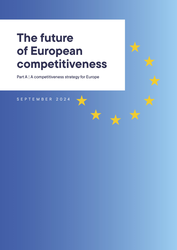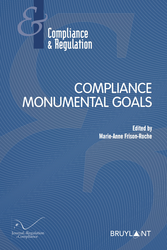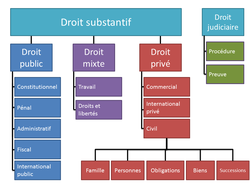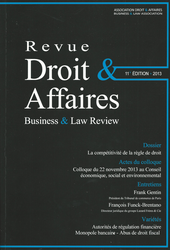Thesaurus : Doctrine

► Full Reference: Deffains, B., Compliance and International Competitiveness, in Frison-Roche, M.-A. (ed.), Compliance Monumental Goals, series "Régulations & Compliance", Journal of Regulation & Compliance (JoRC) and Bruylant, to be published.
____
► Article Summary: Compliance, which can be defined first and foremost as obedience to the law, is an issue for the company in that it can choose as a strategy to do or not to do it, depending on what such a choice costs or brings in. This same choice of understanding is offered to the author of the norm, the legislator or the judge, or even the entire legal system, in that it makes regulation more or less costly, and compliance with it, for companies. Thus, when the so-called “Vigilance” law was adopted in 2017, the French Parliament was criticized for dealing a blow to the “international competitiveness” of French companies. Today, it is on its model that the European Parliament is asking the European Commission to design what could be a European Directive. The extraterritoriality attached to the Compliance Law, often presented as an economic aggression, is however a consubstantial effect, to its will to claim to protect beyond the borders. This brings us back to a classic question in Economics: what is the price of virtue?
In order to fuel a debate that began several centuries ago, it is first of all on the side of the stakes that the analysis must be carried out. Indeed, the Law of Compliance, which is not only situated in Ex Ante, to prevent, detect, remedy, reorganize the future, but also claims to face more “monumental” difficulties than the classical Law. And it is specifically by examining the new instruments that the Law has put in place and offered or imposed on companies that the question of international competitiveness must be examined. The mechanisms of information, secrecy, accountability or responsibility, which have a great effect on the international competitiveness of companies and systems, are being changed and the measure of this is not yet taken.
____
________
Thesaurus : Doctrine

► Full Reference: S. Pottier, "In Favour of European Compliance, a Vehicle of Economic and Political Assertion", in M.-A. Frison-Roche (ed.), Compliance Monumental Goals, Journal of Regulation & Compliance (JoRC) and Bruylant, "Compliance & Regulation" Serie, 2023, pp. 459-468
____
📘read a general presentation of the book, Compliance Monumental Goals, in which this article is published
____
► Summary of the article (donne by the Journal of Regulation & Compliance - JoRC): Today's monumental goals, particularly environmental and climatic ones, are of a financial magnitude that we had not imagined but the essential stake is rather in the way of using these funds, that is to determine the rules which, to be effective and fair, should be global. The challenge is therefore to design these rules and organize the necessary alliance between States and companies.
It is no longer disputed today that the concern for these monumental goals and the concern for profitability of investments go hand in hand, the most conservative financiers admitting, moreover, that concern for others and for the future must be taken into account, the ESG rating and the "green bonds" expressing it.
Companies are increasingly made more responsible, in particular by the reputational pressure exerted by the request made to actively participate in the achievement of these goals, this insertion in the very heart of the management of the company showing the link between compliance and the trust of which companies need, CSR also being based on this relationship, the whole placing the company upstream, to prevent criticism, even if they are unjustified. All governance is therefore impacted by compliance requirements, in particular transparency.
Despite the global nature of the topic and the techniques, Europe has a great specificity, where its sovereignty is at stake and which Europe must defend and develop, as a tool for risk management and the development of its industry. Less mechanical than the tick the box, Europe makes the spirit of Compliance prevail, where the competitiveness of companies is deployed in a link with States to achieve substantial goals. For this, it is imperative to strengthen the European conception of compliance standards and to use the model. The European model of compliance arouses a lot of interest. The duty of vigilance is a very good example. It is of primary interest to explain it, develop it and promote it beyond Europe.
________
Thesaurus : Doctrine

► Full Reference: Marty, F., The Case for Compliance Programs in International Competitiveness: A Competition Law and Economics Perspective, in Frison-Roche, M.-A. (ed.),Compliance Monumental Goals, series "Compliance & Regulation", Journal of Regulation & Compliance (JoRC) and Bruylant, to be published.
____
► Article Summaryésumé de l'article (done by the Journal of Regulation & Compliance): The author analyzes economically the question of whether the compliance programs set up to respect competition rules are for the sole purpose of avoiding sanctions or also contribute to the goal of increasing the international economic performance of companies. which submit to them.
The author explains that companies integrate by duplication external standards to minimize the risk of sanctions, developing a "culture of compliance", which produces their competitiveness increase and the effectiveness of the legal and economic system. In addition, it reduces the cost of investment, which increases the attractiveness of the company.
In this, this presentation based on the postulate of the rationality of companies and investors, compliance programs can fall under self-regulation. The duplication of the law that they operate takes place largely according to "procedural" type methods.
____
📝 go to the general presentation of the book 📘Compliance Monumental Goals, in which this article is published
________
Sept. 9, 2024
Thesaurus : Doctrine

► Référence complète : M. Draghi, The future of European competitiveness, rapport, septembre 2024, 397 p., dit "rapport Draghi"
____
📓lire la première partie du rapport Draghi, A competitiveness strategy for Europe
► Référence complète : M. Draghi, The future of European competitiveness. Part A - A competitiveness strategy for Europe, rapport, septembre 2024, 69 p.
____
📓lire la seconde partie du rapport Draghi, In-depth analysis and recommendations
► Référence complète : M. Draghi, The future of European competitiveness. Part B - In-depth analysis and recommendations, rapport, septembre 2024, 328 p.
________
Feb. 3, 2024
Interviews

► Référence complète : Ch. Lapp, "L’usage par les entreprises des outils de la compliance (d’une façon non-mécanique)", entretien mené par M.-A. Frison-Roche à l'occasion d'une série d'entretiens sur le Droit de la Compliance, in Fenêtres ouvertes sur la gestion, émission de J.-Ph. Denis, Xerfi Canal, enregistré le 12 décembre 2023, diffusé le 3 février 2024
____
🌐consulter sur LinkedIn la présentation de l'interview de Christophe Lapp
____
🌐consulter sur LinkedIn le compte-rendu de l'interview de Christophe Lapp
____
🎥visionner l'interview complète sur Xerfi Canal
____
► Point de départ : En 2023 Christophe Lapp écrit une contribution sur 📝La compliance dans l'entreprise : les statuts du process, dans 📕La juridictionnalisation de la Compliance.
🧱lire la présentation de cette contribution ➡️cliquerICI
____
► Résumé de l'entretien :
Marie-Anne Frison-Roche. Question : Dans votre article vous affirmez qu’« il faut dépasser la conformité pour aller vers la Compliance », pouvez-vous nous en dire plus ?
Christophe Lapp. Réponse : Il répond que
____
MaFR. Q. : On dit souvent que la Compliance est perçue comme une perte de compétitivité. Quel est votre point de vue de praticien international ?
Ch.L. R. : Il répond que
____
MaFR. Q : Certaines entreprises s’interrogent sur l’over compliance ; que leur répondre ?
Ch.L. R.: Il répond que
________
July 3, 2023
Newsletter MAFR - Law, Compliance, Regulation

♾️suivre Marie-Anne Frison-Roche sur LinkedIn
♾️s'abonner à la Newsletter MAFR Regulation, Compliance, Law
____
► Référence complète : M.-A. Frison-Roche, "Compliance. CJIP : le calcul de l'amende d'intérêt public / CJIP, Vercel (Lactalis), 30 mars 2023", Newsletter MAFR Law, Compliance, Regulation, 3 juillet 2023.
____
📧Lire par abonnement gratuit d'autres news de la Newsletter MAFR - Law, Compliance, Regulation
____
🧱 Si l'entreprise n'a pas directement gagné d'argent, quel peut être le montant de l'amende d'intérêt public fixé par une CJIP ? Analyse de la CJIP du 30 mars 2023 Groupe Lactalis, validée par l'ordonnance du Président du Tribunal de Besançon du 1ier juin 2023.
____
📧lire l'article ⤵️
March 15, 2023
Thesaurus : Doctrine

► Full Reference: L. Benzoni, "International Trade, Competitivity and Sovereignty: Towards a Political Economy of Compliance", in M.-A. Frison-Roche (ed.), Compliance Monumental Goals, coll. "Compliance & Regulation", Journal of Regulation & Compliance (JoRC) and Bruylant, 2023, p. 447-458.
____
📘read a general presentation of the book, Compliance Monumental Goals, in which this article is published.
____
► Summary of the article:
________
Sept. 1, 2022
Thesaurus : Doctrine

► Full Reference: B. Deffains, "L’enjeu économique de compétitivité internationale de la compliance" ("The economic challenge of international competitiveness of Compliance"), in M.-A. Frison-Roche (ed.), Les Buts Monumentaux de la Compliance, coll. "Régulations & Compliance", Journal of Regulation & Compliance (JoRC) and Dalloz, 2022, p. 355-366.
____
📕read a general presentation of the book, Les Buts Monumentaux de la Compliance, in which this article is published
____
► Summary of the article (done by the Author, translated by the Journal of Regulation & Compliance) : "Compliance", which can be define as obedience to the regulations is a stake for the company in that it can choose as a strategy to do it or not to do it, according to what costs it and brings it such a choice. This same choice of understanding is offered to the author of the norm, the Legislator or the Judge, even the entire legal system making regulation more or less expensive, and compliance with it for businesses. So when the French law known as “Vigilance law” was adopted in 2017, the French Parliament was criticized for dealing a blow to the “international competitiveness” of French companies. ”Today, it is on its model that the European Directive is conceived. The extraterritoriality attached to Compliance Law, often presented as an economic aggression, is nevertheless a consubstantial effect, with its desire to claim to protect beyond borders. , coming us back to a classic question in Economics: what is the price of virtue?
To fuel a debate that began a few centuries ago, it is on the side of the issues that the analysis must be made economically. Indeed, Compliance Law is not only located in Ex Ante, to prevent, detect, remedy, reorganize the future, but also claims to face more "monumental" difficulties than traditional branches of Law. And it is concretely by examining the new instruments that Compliance Law has put in place and offered or imposed on companies that the question of international competitiveness must be examined. The mechanisms of information, secrecy, accountability or responsibility, which have a great effect on the international competitiveness of companies and systems, have changed and their measure has not yet been taken.
________
Updated: Sept. 1, 2022 (Initial publication: Nov. 4, 2021)
Publications

🌐 follow Marie-Anne Frison-Roche on LinkedIn
🌐 subscribe to the Newsletter MAFR Regulation, Compliance, Law
____
► Full Reference: M.-A. Frison-Roche, "Appréciation du lancement d'alerte et de l'obligation de vigilance au regard de la compétitivité internationale" ("Assessment of whistleblowing and of the obligation of vigilance with regard to international competitiveness"), in M.-A. Frison-Roche (ed.), Les Buts Monumentaux de la Compliance, coll. "Régulations & Compliance", Journal of Regulation & Compliance (JoRC) and Dalloz, 2022, p. 413-436.
____
📝read the article (in French)
____
🚧read the bilingual Working Paper which is the basis of this article, with additional developments, technical references and hyperlinks
____
📕read a general presentation of the book, Les Buts Monumentaux de la Compliance, in which this article is published
____
► English summary of the article (done by the Journal of Regulation & Compliance): Taking up the legal tools of Compliance and confronting them with the concern that Law must have for the Competitiveness of companies, it is necessary that these legal instruments not harm it because Compliance Law, because of its immense ambitions, can only function through an alliance between political wills with great pretensions (save the planet) and the entities which are able to achieve these goals (the crucial economic operators : the political drawing on the compagnies" power, it would be contradictory for the legal instruments put in place by Law to harm the ability of companies to face global economic competition, or worse to favor international competitors acting under legal systems which do not integrate Compliance obligations.
From this principle, it is possible to assess these two legal techniques of whistleblowing and vigilance obligation: both consist in capturing Information, which gives them a strong uniqueness and fits them into the global competition for Information.
Taking the whistleblowing, its first beneficiary is the company itself since the firm discovers a weakness and can therefore remedy it. Therefore, beyond the principle of protection of the whistleblower by their access to the legal statute, for instance the one conceived by the French 2016 law known as "Sapin 2", it is questionable that all the incentives are not put in place so that the holder of such information transmits it to the manager. It is not the European solution, even after the European Directive of 2019, national legal systems continuing to require the absence of financial compensation, the "heroic figure of the whistleblower and the refusal of their remuneration depriving the company of Information and improvement. First to the manager, with external transmission taking place if the latter does nothing, the internal manager is thus encouraged to act and put an end to the dysfunction, which increases the competitiveness of the company.
But the French legislation has on the contrary developed the right incentive as to the person to whom the information is transmitted because by obliging to transmit first to the manager, the external transmission intervening if the internal management does nothing, the incentive is thus made to the internal manager to act and put an end to the dysfunction, this legal solution increasing the competitiveness of the company.
Even more, and even if it seems counter-intuitive, the obligation of vigilance increases the competitiveness of the obliged companies. Indeed, Law by obliging them to prevent and fight against violations of human rights and the environment has tacitly given them all the necessary powers to do so, notably the power to collect Information on third-party companies, including (and even above all) those which are not subject to transparency obligations. In this respect, companies, as far as they are personally responsible, hold supervisory power over others, a power which allows to globalize Compliance Law and which, in the process, increases the Companies' own power. Therefore, the obligation of vigilance is in many respects a boon for the companies which are subject to it. The resumption of the mechanism by the next European Directive, itself indifferent to the territory, will only strengthen this global power of vigilant companies over possibly foreign companies which become its passive subjects.
________

Updated: Feb. 5, 2022 (Initial publication: Oct. 10, 2021)
Publications

 ► Full Reference: Frison-Roche, M.-A., Duty of Vigilance, Whistleblowing and International Competitiveness, Working Paper, September 2021.
► Full Reference: Frison-Roche, M.-A., Duty of Vigilance, Whistleblowing and International Competitiveness, Working Paper, September 2021.
____
🎤 this Working Paper is the basis for a conference , in the colloquium Effectiveness of Compliance and International Competitiveness, co-organised by the Journal of Regulation & Compliance (JoRC) and the Center for Law and Economics of the Panthéon-Assas University (Paris II), November 4, 2021
____
📝this Working Paper is also the basis for an article. This article is to be published ⤵
in its French version in the book 📕Les buts monumentaux de la Compliance, in the series 📚Régulations & Compliance
in its English version in the book 📘Compliance Monumental Goals, in the series la collection 📚Compliance & Regulation
____
► Working Paper Summary: The "Compliance Tools" are very diverse. If it has been chosen to study more particularly among these the obligation of vigilance and the whistleblower, these rather than others and to study them together, it is because they present in the perspective of the specific topic chosen, namely "international competitiveness", and for companies, and for economic zones considered, and for legal system inseparable from them, a uniqueness: these are mechanisms which release Information.
By order of the law, the company will not only stop ignoring what it covered with the handkerchief that Tartuffe held out to it or that a conception of Company Law legitimately allowed it to ignore. This article does not examine if this revolution made by Compliance Law expresses in the legal system is on the one hand legitimate and on the other hand effective: the article measures what is happening at the regard to "international competitiveness".
Compliance Law is therefore be examined here through its instruments, and not in relation to its normativity. In fact, its instruments are intended to provide Information and to make this information available, in its presentation, in its intelligibility and in the hands of those who are able to use Information in perspective of the Compliance Monumental Goals, achieving them.
Regarding this central notion of Information, international competitiveness will be more particularly concerned because Compliance Law will oblige the company itself to seek out, then expose to everyone's eyes, in particular its competitors, its weaknesses, its projects, its alliances, its flaws. This does not pose a problem if its competitors themselves are often subject to this new branch of Law, which goes far beyond transparency, which is already a new mechanism because a company is not a transparent organization and Competition Law that governs ordinary businesses never required this. But if they are not subject to this incredibly special branch of Law that is Compliance Law, then there is a distortion of competitiveness by the very fact of the Law.
It is possible to pretend that the markets like virtue, that they give it credit because they are themselves based on the idea of "promise", which is ultimately based on a moral concept, but this provision of Information to others, while others remain opaque, is a major problem of competitiveness, which the legal requirement of "loyal commercial practices" only very partially considers.
Therefore, it is necessary to first examine what is the economic and financial power of the information captured by the company on itself thank to Compliance Law making available to all but firstly to the compagny itself through the whistblowing mechanism, organised by the laws, differently in the US and Europe (I). Compliance Law also obliges companies to be accountable not only for what they do but also for what others do for them. Through the obligation of Vigilance, objective Ex Ante obligation and duty, the company obtains a power of Information on others which could well resolve what is often presented as the dispute aporetic of the extraterritoriality of Compliance Law, thus making accountable companies hitherto protected by their "preserved" legal system and thereby affected by the effectiveness of Compliance Law (II).
____
read below the developments
Nov. 4, 2021
Publications

► Full Reference: M.-A. Frison-Roche, " Assessment of whistleblowing and the obligation of vigilance regarding international competitiveness", in M.A. Frison-Roche (ed.), Compliance Monumental Goals, series "Compliance & Regulation", Journal of Regulation & Compliance (JoRC) et Bruylant, 2023, p.
____
► Article Summary: Taking up the legal tools of Compliance and confronting them with the concern that Law must have for the Competitiveness of companies, it is necessary that these legal instruments not harm it because Compliance Law, because of its immense ambitions, can only function through an alliance between political wills with great pretensions (save the planet) and the entities which are able to achieve these goals (the crucial economic operators : the political drawing on the compagnies" power, it would be contradictory for the legal instruments put in place by Law to harm the ability of companies to face global economic competition, or worse to favor international competitors acting under legal systems which do not integrate Compliance obligations.
From this principle, it is possible to assess these two legal techniques of whistleblowing and vigilance obligation: both consist in capturing Information, which gives them a strong uniqueness and fits them into the global competition for Information.
Taking the whistleblowing, its first beneficiary is the company itself since the firm discovers a weakness and can therefore remedy it. Therefore, beyond the principle of protection of the whistleblower by their access to the legal statute, for instance the one conceived by the French 2016 law known as "Sapin 2", it is questionable that all the incentives are not put in place so that the holder of such information transmits it to the manager. It is not the European solution, even after the European Directive of 2019, national legal systems continuing to require the absence of financial compensation, the "heroic figure of the whistleblower and the refusal of their remuneration depriving the company of Information and improvement. First to the manager, with external transmission taking place if the latter does nothing, the internal manager is thus encouraged to act and put an end to the dysfunction, which increases the competitiveness of the company.
But the French legislation has on the contrary developed the right incentive as to the person to whom the information is transmitted because by obliging to transmit first to the manager, the external transmission intervening if the internal management does nothing, the incentive is thus made to the internal manager to act and put an end to the dysfunction, this legal solution increasing the competitiveness of the company.
Even more, and even if it seems counter-intuitive, the obligation of vigilance increases the competitiveness of the obliged companies. Indeed, Law by obliging them to prevent and fight against violations of human rights and the environment has tacitly given them all the necessary powers to do so, notably the power to collect Information on third-party companies, including (and even above all) those which are not subject to transparency obligations. In this respect, companies, as far as they are personally responsible, hold supervisory power over others, a power which allows to globalize Compliance Law and which, in the process, increases the Companies' own power. Therefore, the obligation of vigilance is in many respects a boon for the companies which are subject to it. The resumption of the mechanism by the next European Directive, itself indifferent to the territory, will only strengthen this global power of vigilant companies over possibly foreign companies which become its passive subjects.
____
🚧 read the bilingual Working Paper, basis for this article
____
____
► read the presentations of the other Marie-Anne Frison-Roche's contributions in this book:
📝Compliance Monumental Goals, beating heart of Compliance Law,
📝Definition of Principe of Proportionality and Definition of Compliance Law,
📝 Role and Place of Companies in the Creation and Effectiveness of Compliance Law in Crisis,
__________
Updated: Jan. 14, 2021 (Initial publication: Dec. 14, 2020)
Conferences

► Full Reference : Frison-Roche, M.-A., The Economic Attractiveness of Impartiality ("L'attractivité économique de l'impartialité"), in ""Economic Attractiveness, Judge Office and Impartiality. Thinking the judge Office" ("L'attractivité économique, l'office du juge et l'impartialité. Penser l'office du juge"),
____
🎥 watch the conference (in French with English subtitles)
____
📝 read the colloquium program ( in French)
📝 see the general program of the cycle on the Judge Office.
____
📝 read François Ancel's article of 14th of January 2021 in the Receuil Dalloz and which report this colloquium (in French)
📝 read the Working Paper, basis of this conference.
This Working Paper is significantly different from the conference because it was conceived befor the colloquia cycle beginning. In addition, since this manifestation was a Round Table, the conference has taken more into account previous conferences and what said the other two speakers.
📊 see the slides, basis of the conference (in French)
The slides could not be shown during the conference. Orally, it was appropriate to more develop the introductory remarks for emphasizing the human and unique dimension of the Judge Office, expected in economic matters. As a result, the second part of the conference was not given orally, so slides therefore remain the only media available.
____
► Summary of the conference : To fit into the ambition of this general colloquia cycle, which is to "Think the Judge Office" and in this round table which apprehends the imperative of economic attractiveness of this office, firstly emerges the seemingly contradictory relationship between this imperative and the distance that the judge must maintain. Thus it is often asserted that the judge should be internalized at this point in the "places", - an economic concept of great scope (to which the first part of the introduction is devoted, defining the "place" at the same time as a closed and porous space and as a "systemic litigant" -, that he/she should ipso facto lose his/her distance, that is to say his/her impartiality. As places are in competition, even if weighing on one hand the effectiveness of the place, and on the other hand the impartiality of a judge who is external to this place - Judge referring to the Law , Impartiality would necessarily emerge weakened. It would then be necessary on a case-by-case basis to get the judge to give the desired concessions...
The conference aim is to take the opposite position and to state that the Place - in particular because they must be strongly distinguished from the Markets, of which they were the ancestors - require a Judge, who is at the same time "singular", that is to say with a personality, a face, opinions, and in distance so that his/her imagination does not surprise Place. Indeed, these require a human Justice, and a not mechanical one and singular judges, of whom the juge des référés or the arbitrator are the epigone, meets this need. But for reducing their "margins of discretion", how Economy qualifies the Impartiality of a person who can never be neutral, the singular Judge's Office must be inserted into mechanisms reducing these margins. In this way, the Place may reach a Judge who is always more impartial, and in doing so the Place becomes always more attractive.
To achieve this in practice, the place expresses two legitimate expectations, as a "systemic litigant", whose satisfaction increases and the singular Judge's Impartiality and increases the Attractiveness of the Place as a space. This clearly shows that the Place's Attractiveness and the Judge's Impartiality, because judges are inserted into procedures, into institutions and into a "jurisdictional family", are not only not contradictory, but are on the contrary convergent, one fueling the other.
Concretely, and judicial practice shows it, it is necessary to consolidate the particular Judge's Impartiality by inserting him/her into collective processes. As it is necessary to promote a radiance of Impartiality by strengthening the "jurisdictional family".
To consolidate the singular Judge's Impartiality by inserting him/her into collective processes, it is necessary to admit without hesitation the subjectivity of the judge, to seek it even. The reduction of the margins of discretion, definition of impartiality, being obtained by the inclusion of the judge in a procedure of which he /her alone is the master but in which he/her is not alone. This has the technical consequence that he/her is himself/herself in an adversarial debate, not only during the proceedings, but also before (in the media), inside the judgment (and the decision of the Criminal Chamber of 25 November 2020 is a model of that) and after the judgment. By that, the Judge shows that by his/her office he/she is in the future, as climate justice will show. In addition, to limit his/her margins of discretion, the singular judge must fit into a rational principle of coherence, vertical and horizontal. Vertical coherence, because he/she integrates what it is said and the technique of the "determining opinion" is to be encouraged, the singular judge having to avoid it only if he/she has "strong reasons" to do it. This is to follow this general rule Comply or Explain (which is the very opposite of blind obedience). Horizontal coherence, because the singular judge either sticks to what he/she said, estoppel also being a rule of logic. But above all, the institution must extract as much as possible from " institutional doctrines", by all means, of which the annual reports are an example.
To consolidate the singular Judge's Impartiality by strengthening the notion and reality of the "Jurisdictional Family", it is necessary to have of it a broader conception, which could lead to "guidelines" common to various jurisdictions, and a stronger one, by integrating those surrounding the judge to lead to judgment. In this, the procedure before the Court of Justice of the European Union, working on a common file, is a model. If this community were even stronger, the Judge Office would be even more useful than it is already in the digital space.
Thus, Judges who are always human, always diverse, always singular, who listen, consider and adjust to the situation, who within a Jurisdictional Family fit into an Institutional Doctrine which transcends and supports them but which they transform if there is a strong reason to do so, a reason always expressed said: this is the embodied Impartiality that makes an economic and financial Place attractive.
________
Sept. 28, 2020
Thesaurus : Soft Law
Full reference: Giuliani-Viallard, A., The Europe of Compliance, at the heart of tomorrow's world. For a transformation of our European businesses and the upturn in their international competitiveness, European Issue, n°572, policy paper from the Robert Schuman Foundation, 28th of September 2020, 3 p.
June 15, 2018
Thesaurus : Doctrine
► Référence complète : G. Canivet, "Le débat common law versus civil law sur la performance économique du droit est-il pertinent ?", Revue d'économie financière, 2018/1, n° 129, pp.31-51.
____
► Résumé de l'article :
____
🦉Cet article est accessible en texte intégral pour les personnes inscrites aux enseignements de la Professeure Marie-Anne Frison-Roche
________

Updated: May 30, 2018 (Initial publication: Sept. 23, 2017)
Publications

This working document served as a basis for a lecture given in French at the Académie des Sciences morales et politiques (French Academy of Moral and Political Sciences) on September 25, 2017, in the cycle of conferences conducted under the presidency of Michel Pébereau, Quelles réformes ? (What reforms?)
Consult the presentation (in French) of the conference cycle (2017).
It served as the basis for the publication of an article published in French in 2018 in the book directed by Michel Pébereau Réformes et transformations (Reforms and transformations).
April 17, 2014
Publications

►Référence complète : M.-A. Frison-Roche, "Les décisions des juges et des régulateurs favorisent-elles la compétitivité des entreprises françaises ?", in Revue Droit & Affaires, La compétitivité de la règle de droit, 11ième vol., Université Panthéon-Assas, avril 2014, p.140-157.
____
►Résumé de l'article : l'essentiel pour qu'une entreprise et/ou une place puissent se développer tient à ce qu'elle puisse anticiper.
Parce que le sujet porte sur le juge et le régulateur, et non pas sur toutes les sources du droit, ce qui mènerait sinon à traiter du thème de la sécurité juridique, il convient de déterminer ce que les entreprises sont en droit d'attendre d'un juge ou d'un régulateur.
Une entreprise est en train d'attendre de ceux-ci qu'ils ne soient pas "discrétionnaires", car ils n'ont pas de légitimité à l'être et l'effet de surprise est nuisible à l'économie.
Pour éviter des marges excessives de discrétion, il est inutile de fait de contrôler le juge, car il est lui-même le contrôleur et l'on s'épuise à chercher le gardien du gardien.
Le seul moyen est l'observation par l'autorité de régulation et par les juridictions d'une cohérence de principes auxquels elles se tiennent.
Dans le vocabulaire nord-américain, cela est désigné comme la "doctrine" des administrations et des cours.
Ainsi, la compétitivité de l'économie française sera favorisée par les régulateurs et par les juges, non pas parce qu'ils seraient plus doux, cléments et libéraux, mais parce qu'ils se tiendraient à une doctrine, laquelle réduiraient leur marge de discrétion, qui est la pire des choses pour la sécurité des investissements et de l'action vers le futur, définition même de l'entreprise.
____
Lire la quatrième de couverture du volume dans lequel la contribution a été publiée.
____
🧮 lire la présentation du colloque, son programme et la présentation de l'intervention orale, dont les slides.
____
📝lire l'article
____
🚧Lire le document de travail à partir duquel la présentation orale a été construite, duquel l'article a été tiré. Ce Working Paper a été ultérieurement mis à jour, en fonction de l'activité, les dates de mises à jour étant alors successivement mentionnées
________

Feb. 18, 2014
Publications

► Référence générale : Frison-Roche, M.-A., Les décisions des juges et des régulateurs favorisent-elles la compétitivité des entreprises françaises ?, document de travail, février 2014.
____
Ce working paper a servi de base à un article publié dans la Revue Droit & Affaire
____
►Résumé du document de travail : Les agents économiques sont autant soucieux des régulateurs que des juges. Il est très difficile de mesurer la compétitivité des décisions de ceux-ci, en dehors des formules générales que l’on assène aisément sur la nécessité de rapidité, de prévisibilité et de sécurité. Mais ce sont des qualités que l’on demande à toute source de contrainte. En outre, concernant les décisions des juges et des régulateurs, la difficulté tient au fait qu’il est difficile de scinder une décision de la procédure qui la précède. Quand on interroge les économistes, ils disent que l’essentiel est que l’agent sache à quoi s’en tenir, pour maîtriser ensuite ses coûts. Pour cela, il faut précisément que ces décisions, quelle que soit leur nature juridique, constituent une « jurisprudence ».
Mais, en premier lieu, si l’on aborde la question d’une façon générale, pour que l’on puisse parler de « jurisprudence », il faut qu’il y ait un corps de « doctrine ». Ainsi, paradoxalement, les régulateurs ont davantage une jurisprudence que n’en produit le monde judiciaire, plus disparate. En second lieu, on ne peut avoir une vision si globale. Il convient de partir des cas. Ainsi, la jurisprudence de la chambre sociale de la Cour de cassation est-elle « compétitive » ? Son dogmatisme, qui la rend coûteuse, ne la rendait-elle pas prévisible ?
Plus encore, un arrêt récent de la première chambre civile de la Cour de cassation qui récuse l’analyse économique du droit, revendiquant l’imperméabilité normative entre les deux ordres que sont l’économie et le droit, est-il compétitif ? Allant de plus en plus finement, puisque le droit devient de plus en plus casuistique, c’est une à une qu’il faut prendre les décisions. On peut, à titre d’exemples, prendre quatre décisions récentes du second semestre 2013, de la Cour de cassation, du Conseil d’État et de l’Autorité des Marchés Financiers.
____
Lire les développements du document de travail ⤵️
March 1, 2011
Thesaurus : Soft Law